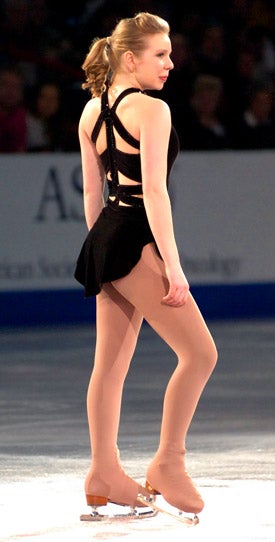Not even two bulging discs have kept 17-year-old Olympic hopeful Rachael Flatt, a senior at Cheyenne Mountain (Colorado Springs, Colo.), from reaching the pinnacle of American figure skating.
Not even two bulging discs have kept 17-year-old Rachael Flatt from reaching the pinnacle of American figure skating. 
Rachael Flatt, Cheyenne Mountain
Photo courtesy of Tara Modlin
A senior at Cheyenne Mountain (Colorado Springs, Colo.), Flatt recently was crowned the No. 1 female figure skater in the USA by virtue of her national-championship performance in Spokane (Wash.). She turned in seven clean triple jumps to score a record 200.11 points.
Flatt, who had been national runner-up each of the previous two years, will represent the USA at the Vancouver, Canada, Winter Olympics from Feb. 12-28. Runner-up Mirai Nagasu, a junior at Arcadia (Calif.), who was the 2008 national champion, also will compete in Vancouver.
"It was a dream – yes and no," the personable Flatt said of her national championship. "It was wishful thinking more than anything, although it was almost reality two years in a row. I always want to have fun in skating. It's more about a performance goal and improving. It always was in the back of my mind, but not a primary goal.
"It's really exciting – an incredible experience so far. The amount of support I have received from everyone is great. It's a great feeling to come out on top. I'm still kind of in shock."
When she was 13, Flatt came out of a spin, fell and injured her back. The bulging discs have been with her ever since. She has been able to at least partially overcome the problem, but it lingers.
"It doesn't quite allow me to do things in my program," she conceded. "I do the best I can. I find other options and try to get a lot stronger. I have to wait and see. I don't think it's going to be that much of a problem (at Vancouver). It won't be career-ending."
Rachael's mother, Jody Flatt, pointed out, "She lost some flexibility. She works really hard to improve her core strength. She exercises every day to help pain management."
The Flatts have watched their talented daughter also thrive in gymnastics, ballet, tennis, skiing and surfing. In addition, she is an "A" student who plans to study chemical engineering in college.
"Her failing in life is golf," Jody laughed. "She's so small (5-foot-1) that she can't see the (next) hole."
Ironically, Rachael's skating career began almost by accident. She was only 3 years old when her father, Jim, took her to a San Diego mall to buy a birthday present for a relative. She had been watching skating exhibitions and asked to sign up for lessons. Meanwhile, the birthday present was forgotten until another day.
"The first time I stepped onto ice," Rachael recalled, "I absolutely loved it, because I could speed away from boys. It was a sense of freedom – all that jumping. I was hooked on jumping. Now I appreciate the artistic aspect. The ability to create on ice is one of the neatest things.
"I've always been incredibly determined and worked hard at everything. It's not just talent, but hard work that's the most prevalent aspect of success."
She obviously was a natural because beginning lessons teach kids how to walk on the ice and how to get up when they fall. She stayed on her feet almost from day one and didn't even need to use the rink wall to steady herself. Her teachers were quite surprised, to say the least. 
Photo courtesy of Tara Modlin
When Rachael was 8, she came under the coaching of Tom Zakrajsek, who was named USOC Developmental Coach of the Year in 1999. His first encounter was an eye-opener.
He recalled, "She had red hair and a big smile on her face. She skated out and said, 'Hello, I'd like to work on my double loop.' I'd never had an 8-year-old girl tell me what she wanted to do. What was unusual was that she wasn't really ready to do a double loop. But I bent my rules. At 8, Rachael had the unusual ability to function on her own."
At age 11, Rachael failed to place at the intermediate level in the Junior National Championships. However, the next year she achieved a major breakthrough by winning the National Novice Championship. After her championship performance, Rachael was nicknamed "The Rock" by the mother of a competitor. Later on, famous Toronto choreographer Lori Nichol viewed some of Rachael's videos and told her, "You are like a rock – so solid."
"It's a cool nickname," Rachael says. "People are appreciative of the consistency I have. It's an honor."
That same year she met Brandon Mroz, also an outstanding skater, who trains with her about 15 hours a week.
Mroz describes the young Rachael as "a really hard worker, mature way beyond her years. I can help her get through the day – give her a pat on the back. Rachael is pretty independent – a stubborn one. Being a perfectionist probably made her what she is today."
Brian Gomez, who has covered Rachael's career for the Colorado Springs Gazette, agrees that she always gives a consistent performance. He pointed out, "She never really has a bad program. She minimizes her mistakes, so they don't hurt her as much with the judges.
"When you look at her upside, she really is just at the beginning. I thought she could be a contender, but I didn't expect (the title) for a couple of years. She was fifth in the World Championships last year. She showed she can compete on a big stage.
"She thrives under pressure. She is so good when the spotlight is on her. Most 17-year-olds would crumble, but she just finds a way to rise to the occasion."
Rachael is the first to admit, "I certainly do have things to improve upon, but I've come a long way from a couple years ago. The sport is a combination of athleticism and art."
The Olympic figure skating is broken into two divisions – the short event, which will be held on Feb. 23, and the long event, which will be held on Feb. 25. Thirty skaters from around the world will compete for three medals, which will be determined on the two combined scores.
"I never predict results of my athletes," coach Zakrajsek said in reference to the upcoming Olympics. "I do think winning is icing on the cake. It's all about delivering two performances that she's happy with. She wants to engage the audience and deliver clean programs.
"In the new scoring system, it's hard to predict results. It's a very unforgiving system."
Under the current scoring system, which tends to stifle daring and creativity, mistakes must be held to a minimum. Rachael has been criticized at times for skating too conservatively, but she simply is doing what it takes to win.
Zakrajsek points out, however, that she has some surprises in her bag of tricks and in time fans – and judges – will be treated to her entire arsenal. She can display more difficult moves in practice and not be penalized.
"When you show (the daring moves) in practice, you can intimidate competitors and also impress judges," the veteran coach said of an interesting strategy.
As she approaches the greatest moments of her budding career, Rachael says, "I'd like to improve on my performance from the nationals. Both programs are solid and there's not much to improve on.
"My main goal is a performance goal – to sell my program. It's going to be important for me to trust my training and allow my compassion to come through."
After training with Rachael since she was 12, Mroz says confidently, "I know she is going to go there and put it all on the line. I'd love to see a medal around her neck. It would be good for us and good for the U.S."